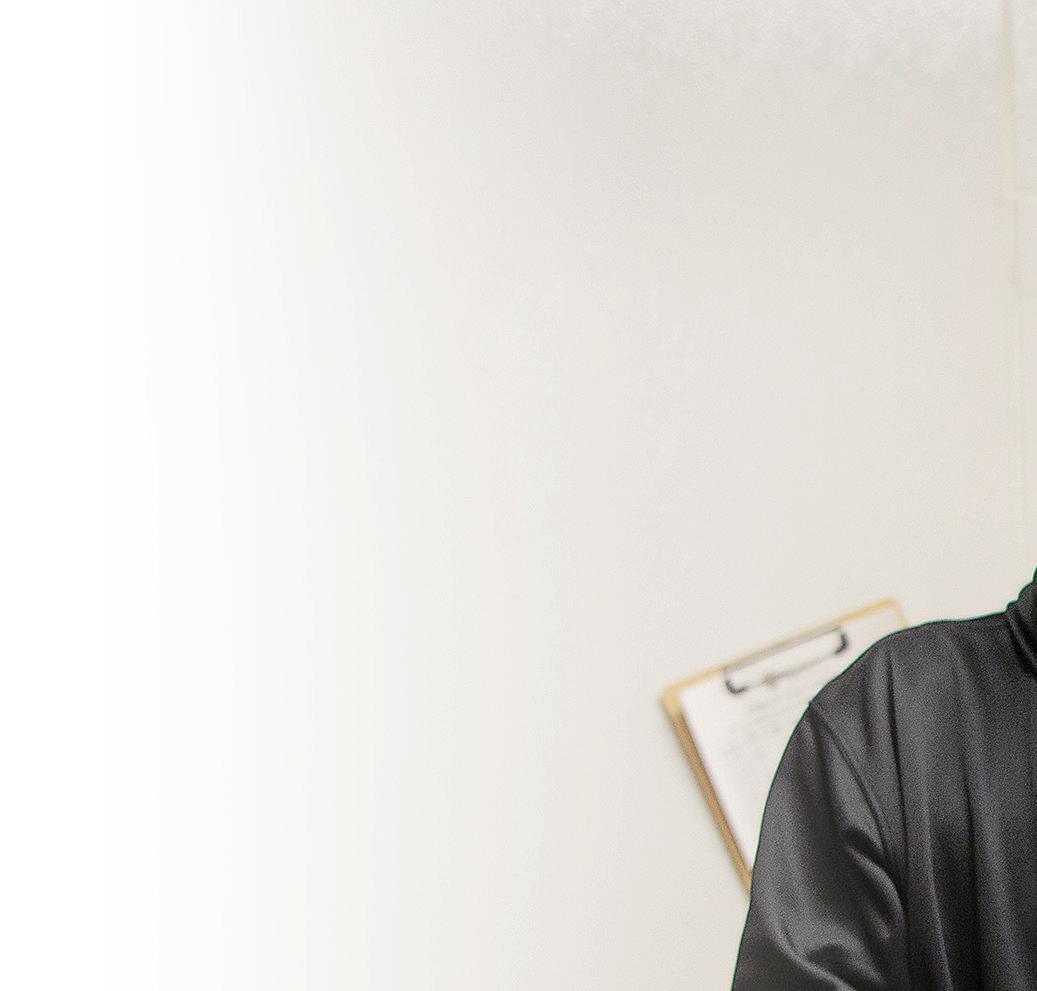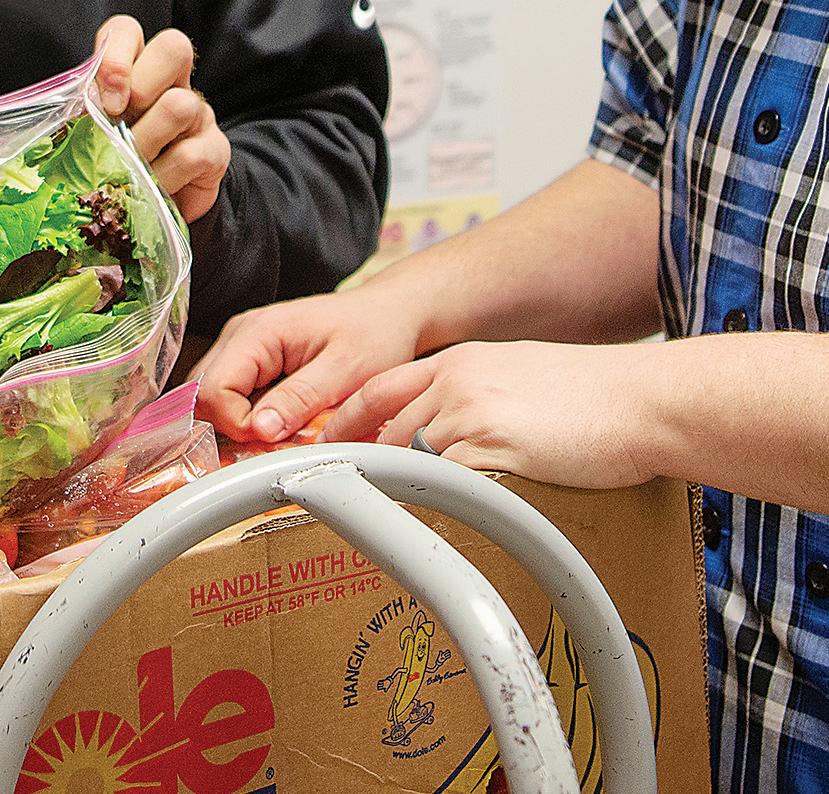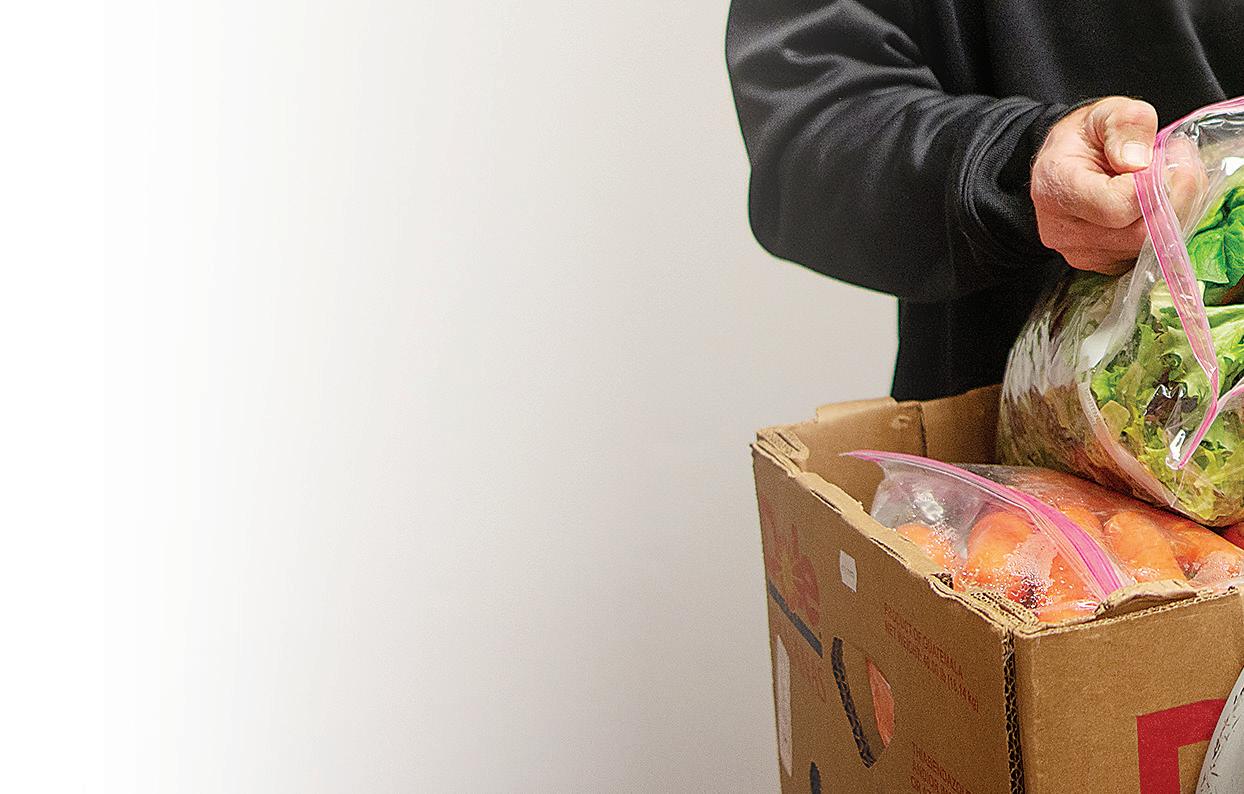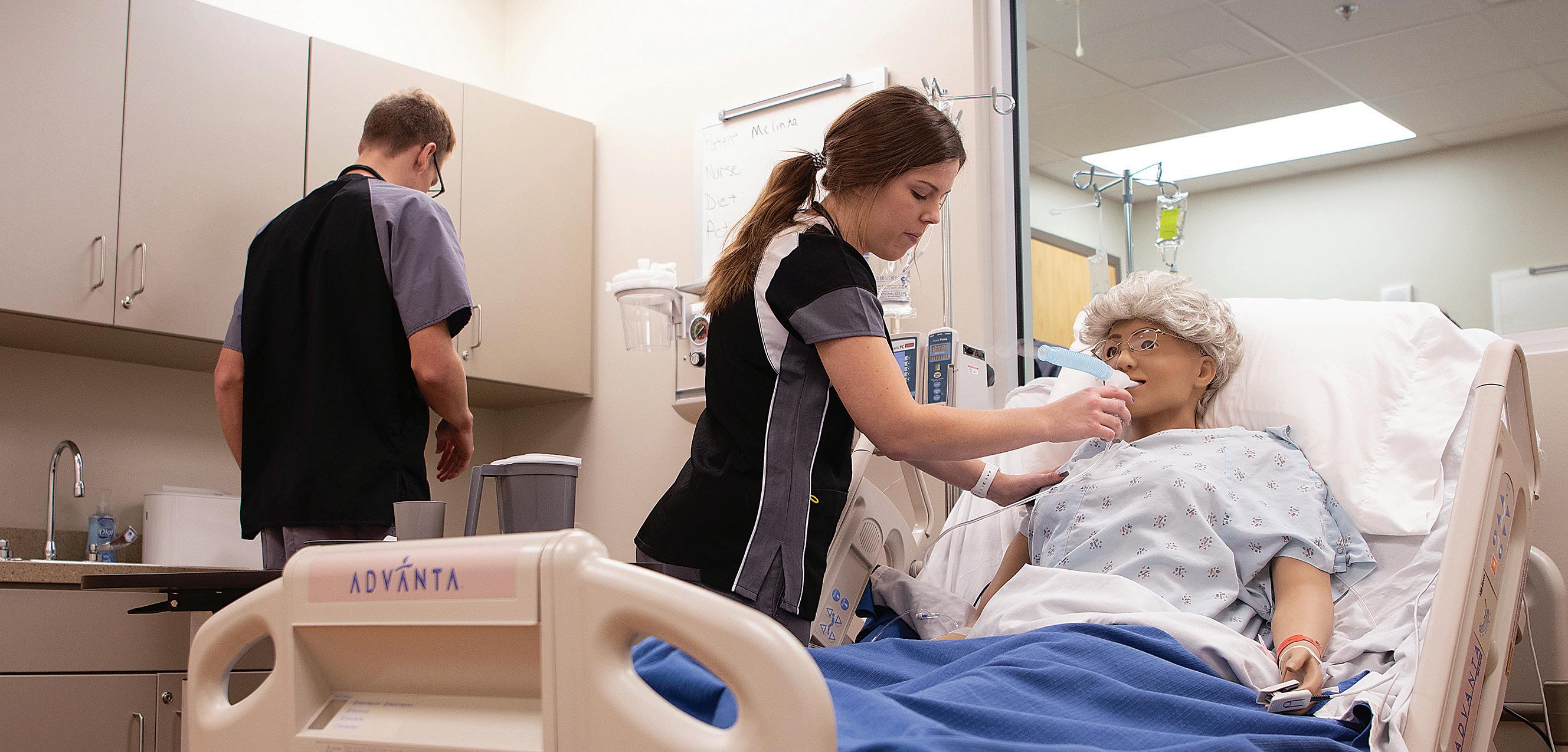
17 minute read
Dordt Dining
MORE LOCALLYGROWN FOOD ON MENU

Advertisement

Fields and farmland surround Dordt University, and Dordt’s food service provider is committed to taking full advantage of that privilege.
In the past four years, Dordt Dining Services, led by Head Chef Nick Lawrence, has purchased locally grown food as often as possible.



The Cornucopia grows seasonal vegetables and herbs, including butterhead lettuce, kohlrabi, garlic, cucumbers, carrots, and potatoes.
“When we buy from local farmers, we know where our food is coming from,” says Lawrence, who has been passionate about eating locally grown food since culinary school. “When I purchase cattle from the Agriculture Stewardship Center at Dordt, I know who raised them. I can fi nd out what they were fed, and, if I want, I can go see the cattle. You are making a connection with the food and the people growing it. This is something that I think is missing in today’s world— people don’t know where their food is coming from anymore.” In the summer and fall of 2019, Dordt Dining bought 7,681 pounds of Dordt Agriculture Stewardship Center beef and 5,090 pounds of potatoes, 850 pounds of carrots, and 450 pounds of zucchini—among other things—from local farms. Much of this produce comes from the Cornucopia, a small organic vegetable, poultry, and pork farm run by the Wesselius family in Sioux Center. “Our relationship with Dordt Dining has grown incrementally,” says John Wesselius (‘85), who runs the Cornucopia. “When they fi rst took over the food service at Dordt, they phoned me, looking for kabocha sunshine squash for a special dinner. That type of squash is not available off a truck—but I grow it. So, I delivered it.” Next growing season, Wesselius and Lawrence began discussions about how Dordt Dining could buy more produce from the Cornucopia. “I enjoy growing vegetables, and I enjoy bantering with people like Nick, who cook the vegetables,” says Wesselius. “One of the reasons I farm is for the relationships. We farmers are growing relationships with God’s creation and with people. Is there a happier thing to do in life than to invest in these relationships?” Lawrence has also been working for the past two years with Dr. Duane Bajema ('71), professor emeritus of agriculture, to provide Dordt students with honey. Bajema maintains beehives on his acreage and at the Agriculture Stewardship Center, and he delivers One of the reasons I farm is for the relationships. We farmers are growing relationships with God's creation and with people. — John Wesselius, farmer about fi ve gallons of honey from these bees to Dordt Dining each month.
“I appreciate working with Nick and Dordt Dining. If there’s a problem, we work together to solve it,” says Bajema. “Buying locally allows you to establish these kinds of relationships; it allows you to care for the people you work with while supporting the local economy.”
Buying locally sometimes takes more investment than buying food from big retailers. Because locally grown food is often of higher quality than imported food, it also tends to cost more. And, local farmers are restricted by Sioux County’s climate, so some foods simply cannot be grown locally. However, Dordt Dining, the local farmers, and students agree that the result is worth the investment.
“Local food is delicious! Once you become accustomed to the fl avors of local produce, it’s hard to want to eat anything else,” says Gretchen (Rops, ’17) Kooyenga, who works at the Cornucopia—a job she fi rst began as a Dordt student. “Most people aren’t going to eat completely locally grown diets, but any steps to incorporate local food is important and makes a diff erence to the consumer, the farmer, and creation.”

One of Dordt’s simulation labs is geared toward obstetrics—it even has a mannequin that can give birth.
AN INSIDE LOOK AT NURSING With changes to their curriculum and facilities, Dordt’s nursing program provides students with more hands-on learning opportunities in a safe environment.
“How are you feeling?” “I—I can’t catch my breath,” says the patient in a shaky voice. Crouching down to eye level and putting her hand on the patient’s shoulder, the nursing student says calmly, “Can you breathe with me? We’re going to breathe in and out. Ready?” monitors the computer screen. The nursing students’ interactions with the patient are recorded, and two doors down from the hospital room, four other nursing students watch their fellow When students go to clinicals, we can’t guarantee they’ll have a patient with
Together, the patient and the nurse breathe in, and out. In, and out. After examining the patient’s chart, another nurse says, “I’m going to go get some medication to help you to breathe better.” He walks toward the door. “OK,” murmurs the patient. “Thank you.” Above the patient’s bed is a mirror, and behind that mirror stand two nursing professors. One speaks through the patient—a mannequin—while the other students’ interactions. Later, the two professors and six students will sit down in the debriefing room to talk through what went well and what might be improved. This space, known as the simulation lab, is just one of the ways Dordt’s nursing an illness related to a concept they’re studying in class, but in lab, we can. — Dr. Debbie Bomgaars, nursing professor program is giving students opportunities to learn better—to make mistakes and gain confidence in a safe environment.
At least twice a semester, students spend time in the simulation, or “sim,” labs. The sim lab mannequins can talk, breathe, and blink; students give them shots, IV medication, and more.
“Students get to learn about theoretical nursing concepts in the classroom, practice the concepts in the skills lab, and apply the concepts in a very realistic setting in the sim lab,” says Melanie (Van De Berg, '95) Wynja, instructor of nursing.
“It’s a little intimidating to be filmed and watched by your peers through the cameras, but it’s very beneficial to practice your skills and critique yourself after and walk through it with your classmates,” says Gideon Brandsma, a junior nursing major from Abbotsford, British Columbia. “Everyone has a different perspective and can provide insights on what went well or what could be improved.”
Students also get to practice in the nursing skills lab—located in what was once the New World Theatre. From sophomore year on, nursing students spend two hours a week in the skills lab, engaged with eight “patients” that are also mannequins. At the beginning of the semester, each patient is given a diagnosis, a health issue, and a chart. As students make their way through concepts, the patient acquires a new complication. Students can then assess and intervene in their care. They also learn the practicalities of the nursing profession—from learning where to stand to how to open packages properly. “When students go to clinicals, we can’t guarantee they’ll have a patient with an illness related to a concept they’re studying in class, but in lab, we can,” says Dr. Debbie Bomgaars, professor of nursing. “In the lab, students get to learn and apply skills in a safer, easier environment than when they’re in front of a human being.” Dordt nursing majors also begin their clinicals during the spring semester of their sophomore year. Bomgaars says the nursing faculty have purposely structured clinicals to expose students to a variety of hospital environments. “They start in community health and then move to a nursing home setting. From there, they go to small hospitals, medium-sized hospitals, and then finish in large hospitals. It helps students build confidence in their abilities,” says Wynja. Caitlin Mundorf, a junior nursing major from Ballwin, Missouri, spent one clinical rotation at Floyd Valley Healthcare in Le Mars, Iowa. Together, she and a small group of students made the 20-minute drive to and from campus. Working on a general floor was a good experience for Mundorf. She was able to apply what she’d learned in the classroom about community health and mental health to her dayto-day interactions with patients. “I learned how to communicate with my patients who are dealing with mental illness—to understand why they may be acting a certain way or exhibiting subtle cues,” she says. Dordt’s nursing faculty have restructured their curriculum to better align with the opportunities provided by the new nursing space. “Traditionally, students learn diagnoses, such as hypertension, and particular nursing skills or assessments they need to make for those diagnoses,” says Dr. Kate Vander Veen, professor of nursing. “When nurses walk into a patient’s room, they are aware of what the diagnosis is, but they’re looking at the patient and assessing how alert the patient is, whether the patient can move about in bed, whether the patient is stressed, and more.” So, the nursing faculty focus on training students to look at the patient as a whole person. “Instead of focusing on specific diagnoses, we focus on the bigger picture. This frees us from a particular regimen and encourages us to pay close attention to what the patient needs,” says Brandsma. SIM LAB To see the simulation lab in action, check out: dordt.edu/zylstra-center.

“The simulations and scenarios our students do directly relate to their clinical experience,” says Melanie Wynja. Faculty in Dordt’s nursing program hope these changes help increase student confidence and give them the practice they need to succeed as nurses.
“We want our students to become distinctively Christian, holistic nurses,” says Wynja. “The resources we now have provide students with experiences that will, once they begin work as nurses, help them to provide safe patient outcomes.”
Professors of Mathematics Dr. Melissa Lindsey and Dr. Mike Janssen are writing an open source textbook for use in an upper-level modern algebra course. The book emphasizes exploration and active learning to help make abstract ideas. The book, which was piloted at Dordt in fall 2018 and at Morningside College in fall 2019, now has an edited version available at book. mkjanssen.org.
In October, Business Professor Dr. Sacha Walicord gave the convocation speech “Science versus Faith: A Dishonest Dilemma” at Reformed Theological Seminary in Jackson, Mississippi. He also taught a seminar on pastoral theology and homiletics at the seminary. Over Thanksgiving, Walicord taught a course on Reformed worship at the Reformed Seminary in Riga, Latvia.
Professor Emeritus of Mathematics Dr. Calvin Jongsma’s textbook Introduction to Discrete Mathematics via Logic and Proof has been published by Springer in their prestigious “Undergraduate Text in Mathematics” series.
Education Professor Dr. Kathleen Van Tol was interviewed for a Fox News article titled “Recognizing Signs of Autism: How Late Diagnosis Could Delay Crucial Intervention.”
Theology Professor Dr. Justin Bailey wrote an article titled “Pagans, Puritans, and Putting Christ Back in Christmas,” which was featured in the December 2019 issue of The Banner.
Health and Human Performance Professor Dr. Craig Stiemsma (’88) was interviewed for a U.S. News and World Report article titled “How to Get into Physical Therapy Schools.”
FIVE QUESTIONS FOR CHRISTIANS TO ASK ABOUT ONLINE COURSES
“Are online courses a good way to learn?”
I hear this question often, and from a variety of people. Lately, though, the question has shifted. Now, many Christians ask, “What should a Christian look for in an online course or program?” As more people consider online learning, many Christians wonder how to choose quality courses and programs that help them to grow not only in their academic, technical, or professional knowledge, but also in their faith development and their ability to live as Christ followers.
This is an important question. As Christ’s followers, we should choose education that deepens our knowledge and helps us to serve Christ more effectively. Yet, many Christians feel uncertain about how to find excellent online learning experiences. This is understandable. After all, many of us are relatively new to online education. Additionally, the quality of online coursework can vary from one place to the next, just as it does in traditional or face-to-face education. When we add in the challenge of finding excellent education that is also seriously Christian, one may wonder where to start.
So, we’re back to the question: “What should I as a Christian look for in an online course or program?” To help answer this question, I am sharing five fundamental questions to ask—along with characteristics to watch for—as you research your options. As someone whose daily work focuses on the development of Christ-centered online education, I’ve found that the questions that matter most are enduring questions that have long been at the heart of teaching and learning.
WHY—WHAT’S THE GOAL? As you consider your options, look at promotional materials, advertised goals and outcomes, and the definitions of “success” implied through the learning objectives, readings, and assignments. Talk to professors. What reasons for completing the course or degree are given to motivate students? Is the emphasis mostly on personal
achievement, a bigger paycheck, and career advancement? Or, are there deeper motivations that are continually apparent, such as better knowing our Lord, serving our neighbors, and caring for God’s creation?
WHO MATTERS? Ask about the learning activities and the requirements for class participation. Is it all about you working for your individual gain, or are you asked to care about your classmates and learn from and with them? Will you be held responsible to contribute to discussions and projects in ways that help others, and to be your brothers’ and sisters’ keeper in their learning? Look again at the syllabus and program materials with another eye to whose voices and concerns matter. In addition to learning from the usual experts in the field, will you encounter thoughtful Christian perspectives on these topics through readings, guest speakers, and assignments? How will your learning enable you to help those in need, and how will you connect with and learn from those you hope to serve? Will the texts you read, hear, or watch and the people who you meet through your online learning bring you and your classmates closer to the vision in Revelation where every tongue, tribe, and nation are gathered together to worship the King?
WHAT IS “GOOD,” AND HOW DO WE KNOW? Truly Christ-centered education starts with God’s creational design for his world and his people. It mourns sin and helps us to see how every area of life is broken and calling out for Christ’s healing and renewal. This should be true in Christ-centered online learning as well. Review course descriptions and talk with faculty to learn what issues you will be asked to think about. Will you be guided to consider God’s will for creation and culture through study of the Bible? Will you be asked to carefully analyze the world around you to understand the ways in which it follows or strays from God’s will? How will you be prompted to notice how humans make idols out of ideas, products, and activities? In addition to previewing content, notice how the course or program defines what is “good” for learning. Ask to see the online learning environment— perhaps through a prepared video or by requesting to join a video call where you can see some screen shares of actual courses. Do you see God-honoring excellence in creative teaching methods, delightful course activities, beautiful design of the learning environment, and high expectations for learning?
HOW WILL YOU BE CHALLENGED AND CHANGED?
Christ-centered education requires much more than the “delivery” of facts and training in skills. Christ followers are called to be transformed (Romans 12:2). Christ-centered education, whether in person or online, should inspire and equip learners to think and live differently. Preview course materials and assignments and ask questions of
instructors. Talk with current and former. How will you be equipped to take a closer, more critical look at your habits, possessions, activities, and values? How will you be taught to better understand some of the leading ideas, arguments, and movements of our day—responding to them in ways that attract others to the light and love of Christ? How will you be inspired to use what you learn so that you can be the hands and feet of Jesus in your work, home, church, and community?
HOW WILL YOU BE CARED FOR? Jesus calls us to love with all our heart, soul, mind, and strength. Notice that he connects our minds with every part of our being. Learners are whole people, and this should be reflected in online learning, too. As you interact with staff and faculty to learn more about the online options you are considering, are you treated with respect and kindness? Are you encouraged to think about God’s calling for your life and how to use the talents he gives you? Are there readily available academic support services to help you, and do faculty
prioritize relational learning through personalized feedback, online office hours, phone calls, video meetings, and email exchanges with students? If you were to become very ill or experience an event that interrupted your education, what policies would protect you academically and financially, and how would you be supported when you were ready to return? Do the course schedules and homework expectations encourage you not only to learn and build relationships with your instructors and classmates, but also to thrive and be fully present in the rest of your life as a family member, friend, neighbor, and active member of your church? We should choose education that deepens our knowledge and helps us to serve Christ more effectively. Yet, many Christians feel uncertain about how to find excellent online learning experiences. This is understandable.
Ultimately, in online education, the centrality of Christ should be evident in every aspect of the experience, including the stated and implied purpose for learning, curriculum that reflects Christ’s rule as Lord over all, teaching that shows the care of Jesus, and learning activities that call students to love classmates, community, and creation. As we are reminded in Dordt’s founders’ vision, education should be “permeated with the spirit and teaching of Christianity.” That’s true online, too.

Professor Emeritus of Philosophy Dr. John Kok served as editor for the (now translated) three-volume work of Abraham Kuyper titled Pro Rege: Living Under Christ’s Kingship. These volumes published by Lexham Press, totaling almost 1,500 pages, appeared in 2016, 2017, and 2019. A Spanish translation of Kok’s Patterns of the Western Mind (1998) was published by Dordt Press in 2019 under the title Los Patrones de la Mente Occidental: Una Perspectiva Cristiana Reformada.
Health and Human Performance Professor Nate Wolf was named GPAC Men’s Cross Country Coach of the Year for the 2019 season. Wolf coached the team to their second consecutive GPAC title and the program’s second straight NAIA National Championship Meet appearance.
Dordt’s Master of Social Work (MSW) program is now accepting applications for the fall 2020 semester. The MSW program offers a Christ-centered social work education with courses that are 100 percent online. For more information, visit dordt.edu/msw.
Dordt University received three silver awards from the Council for Advancement and Support of Education (CASE) District VI. The awards included magazine publishing improvement for The Voice of Dordt University, institution-wide branding effort for Dordt University, and a Dordt University commercial spot.
According to Dordt’s Career Development Center, 99 percent of Dordt’s class of 2019 found employment or were accepted into graduate school within six months of graduation. “Most students choose to attend college to get a good job and begin a career,” says Amy Westra, associate director of career development. “The consistently high career outcome rate at Dordt University may help alleviate some concerns about finding a job and entering the workforce.” Learn more at dordt.edu/ news/49882.
Dordt University is one of three finalists for a Salesforce.org Summit Award. The Excellence in Innovation Award recognizes a college or university that is using Salesforce, a computing service specializing in customer relationship management, to fuel innovation in recruiting, student success, advancement, marketing, community, and engagement.
Vice President for Online and Graduate Education Dr. Leah Zuidema was quoted in a U.S. News and World Report article titled “How to Win a Fulbright Scholarship.”
In October, Admissions Counselor Cody Kaemingk (’15) and Digital Content Strategist Jordan Harmelink (’16) presented “Dordt University: A Salesforce Story” at the Salesforce upper Midwest group meeting in Minneapolis, Minnesota.








